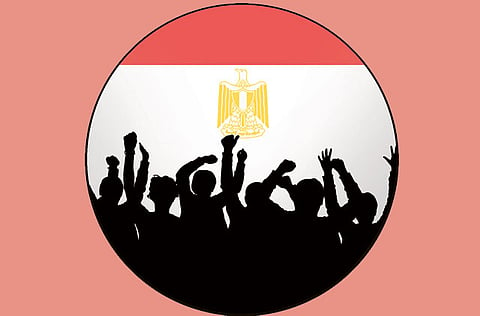Power struggle gains momentum
Whoever is elected Egypt's president will have to keep compromising with the military and the Brotherhood

The race for the top job in Egypt is brightening the stagnant political scene, in a country that hasn’t yet embarked on the road to real change. The Muslim Brotherhood, thirsty for power after more than eight decades of its inception, decided to field a presidential candidate, reneging on a previous promise not to seek the top job. They put forward powerful businessman Khairat Al Shater. Activists were furious, only to be shocked by the announcement that Hosni Mubarak’s spy chief and former vice-president General Omar Sulaiman was also entering the presidential race.
The most popular candidate, the Salafist-backed Hazem Abu Esmail, has to fight a legal issue that could ban him from running for president. A court has ordered authorities to produce evidence of whether his mother has dual Egyptian-US citizenship, something that could disqualify him. The saga surrounding presidential election might help encourage Egyptians to vote, as they just voted enthusiastically in the first elections and then lost interest.
The Supreme Council of Armed Forces (Scaf) wants to hand over power this summer, and according to the temporary constitutional declaration, this needs a president to be elected. The last six months were all about elections, as if Scaf wanted to saturate the country with what it had been deprived of for long — free elections. In autumn, the lower house of parliament (People’s Assembly) was elected over a couple of months. Islamists gained a majority, mainly through the Muslim Brotherhood (Freedom and Justice Party) and Salafist parties Al Nour and Al Asala. The upper house (Shura Council) elections came next, where Islamist parties gained again but there was a far lower turnout this time. Not to mention the referendum over the constitutional declaration earlier last summer, for which Islamists also mobilised their voting bloc.
Recently, the Islamists-led parliament elected a 100-member constitutional assembly with no public vote, so there was no measure of people’s trust in that ‘election’. A court on Tuesday halted a move to create the constitutional assembly, pending a ruling on its legality. The administrative court did not give the reasons for the ruling to suspend the constitutional assembly, only saying that it had halted “the implementation of the decision by the speaker of parliament” to form it. Several lawsuits to the court asked for that specific ruling: halting the formation of the constitution panel by parliament. Dominated by Islamists from the parliamentary majority, the panel is not representative of society. Even the advisory council of the ruling Scaf said that the “constituent assembly is unrepresentative of Egyptians”. Some non-Islamist members already withdrew from the assembly or suspended their participation from the very beginning. There is a genuine fear that the panel is Islamist-dominated while youth, women, Christians and other factions of society are underrepresented.
Conspiracy theories
Islamists are keen to write the permanent constitution before a president is in place, and under the auspices of Scaf. Before that they launched a campaign to control the executive but the Scaf resisted, as it wanted to keep running things till it hands over power. As they didn’t get the cabinet, and found it difficult to write a constitution that was to their liking, the Islamists decided to field a candidate for the presidency. Some anti-Islamist parties and groups talked about a rift, even a struggle, between Brotherhood and Scaf. Others who are sceptical and instead opted for theories that the military and Islamists were conspiring against the revolution and regenerating the Mubarak regime. With Sulaiman running for president, and many ordinary Egyptians believe that he might be the strongman who can help Egypt regain security and stability. Some secularists prefer him as the antidote to Islamism in politics. The conspiracy theories are mushrooming.
Actually, there’s no conspiracy as all that has come to the forefront of politics and power in Egypt since the revolution is reminiscent of the Mubarak regime. That’s why ordinary Egyptians have turned indifferent after the parliamentary election. What you see in the political theatre is a power struggle between all parties; the military, Islamists and others. All of them are seeking power almost for opportunistic ends, claiming to lead the ‘reform’ of the state. The only power that sought real change — revolutionary youth and some veteran patriotic figures — are either killed, wounded, jailed or facing trial while the rest are frustrated and have withdrawn. But at least people are being ‘entertained’ by the debates and campaigns within the old/new elite. The only true ‘politician’ among the known and unknown presidential candidates is the former secretary-general of the Arab League Amr Mousa. He is the one who, unfortunately, can lengthen the transitional period until real ‘change’ starts— rather than just reform. It is not clear what are his chances of being elected, as he’s also one of the Mubarak regime’s figures. If it’s left to popular vote, Abu Esmail is the frontrunner — if his candidacy is not annulled.
If the foreign powers with interests in Egypt (US, Israel, and others) are to vote in presidential elections, they will not chose another Mubarak (Sulaiman) or a populist (Abu Esmail). Most of other independent or ‘revolutionary’ candidates do not have real power bases in society. So, all we will be left with is the Brotherhood candidate or Mousa. Yet, whoever is elected, is not going to be all that powerful —he’ll have to keep compromising with the real powers: the military and the Brotherhood. The true test will be when Scaf hands over power to an elected president and for the majority, the quality of life will either stay the same or get worse. Then, with more workers’ strikes, sit-ins and student protests, real change might be sought.
Dr Ayman Mustafa is a London-based Arab writer.
Sign up for the Daily Briefing
Get the latest news and updates straight to your inbox



